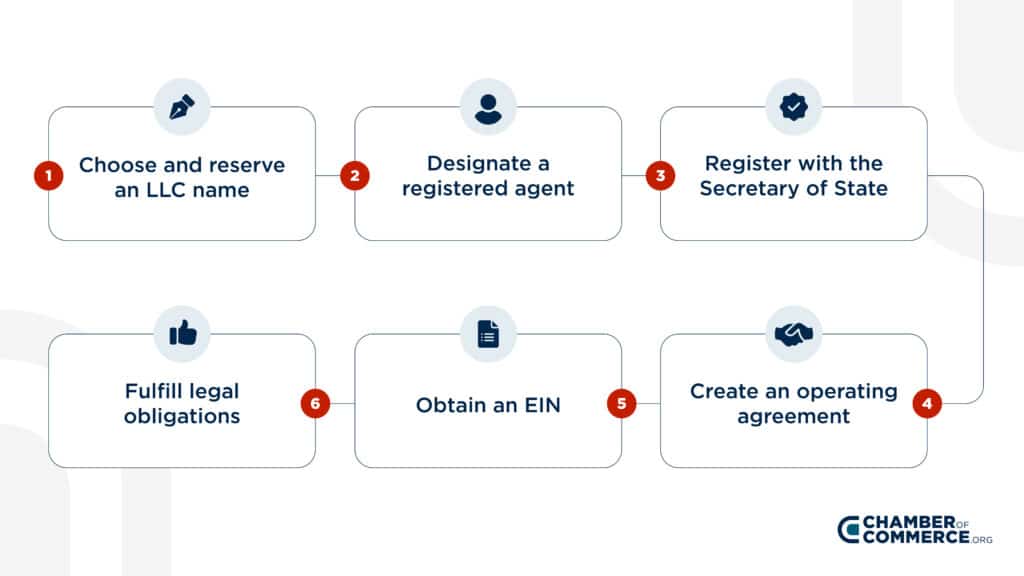

To avoid a misstep in the filing process, follow these steps to start an LLC in New York.
We might receive compensation from the companies whose products we review. We are independently owned and the opinions here are our own.
When starting a new company, choosing a business entity is the most important decision that the founders must make. For most businesses with more than one founding member, forming as an LLC is often the best option for a number of reasons. An LLC is an uncomplicated business structure that affords business owners legal protection by separating personal assets from business debts. Moreover, LLCs often enjoy a lower tax rate than corporations. Nevertheless, creating an LLC can get complicated depending on where you are based, with the formation process, filing fees, and continuing legal obligations differing from state to state.
The process of forming an LLC in New York State involves some unique elements rarely practiced in other states. For one, while in most states an LLC will appoint its own registered agent for service of process, in New York, the Department of State serves as the registered agent for every LLC in the state. The state also imposes additional requirements for an LLC: drafting an operating agreement, optional in most states, is obligatory in New York, as is the publication of a notice of organization in two local newspapers.
There are 2 major guidelines to follow when naming your LLC in the State of New York:
Need help coming up with a business name? Check out our free business name generator.
After choosing a name for your LLC, confirm that it is available in New York with a search of the Department of State Corporation & Business Entity Database.
To prevent another business entity from using your LLC name before you legally organize in the state, it’s a wise idea to reserve the name with the New York Department of State Division of Corporations. File an Application for Reservation of Name by mail to reserve the name for up to 60 days. The filing fee for a name reservation is $20.
If the initial reservation period is not long enough, you can extend the reservation for two additional periods of 60 days by filing a Request for Extension and paying another $20 fee for each extension.
In nearly every other U.S. state, an LLC must appoint its own registered agent service to handle its legal affairs. However, in New York, the Department of State automatically serves as every LLC’s registered agent, accepting legal papers on their behalf and forwarding them to the LLC’s office.
Therefore, an LLC must provide a mailing address to the Department so that any legal papers can be sent its way. Assigning an additional registered agent in the state is optional, but not required.
To start your LLC in New York, you must file Articles of Organization with the New York Department of State Division of Corporations, as opposed to the New York Secretary of State.
The Articles of Organization must provide the following details:
The filing can be completed online or through the mail. The filing fee is $200, which can be paid by check, cash, money order, or credit card.
An LLC is required to publish a copy of its Articles of Organization, or a notice announcing its formation, in two newspapers in the 120-day period following the LLC’s Articles of Organization becoming effective. This publication requirement typically costs $50. The newspapers will issue the LLC affidavits of publication, which must be filed with the New York Department of State along with a Certificate of Publication. The announcement must run for six consecutive weeks.
Unlike in other states, New York law requires an LLC to write and adopt an operating agreement within 90 days of the filing of its Articles of Organization.
The operating agreement should do the following:
Without an operating agreement clarifying the specific duties of its members, an LLC may face significant legal and operational difficulties.
All newly formed LLCs in the United States must acquire an Employer Identification Number (EIN) from the Internal Revenue Service (with the exception of single-member LLCs). The nine-digit EIN is like a social security number for a business and is necessary to pay income tax, file tax returns, open business bank accounts, and perform many other important functions.
You can apply for an EIN online on the IRS website without paying a filing fee.
Once an LLC is registered, you have a few more things on your to-do list to accomplish. You should look into business licenses, be aware of upcoming report filings, set up a business bank account, and start marketing your business with a company website.
In New York, you must file a Biennial Statement. (Other states file an annual report). By filing the proper paperwork every other year, your business will remain in good standing with the state. New York LLCs must file their report by the end of their anniversary month. The biennial filing fee is $9, and the state doesn’t levy late fees against late payments, but if you don’t pay on time, your business won’t be in good standing.
Some New York LLCs may be required to obtain one or more state or local business licenses, permits, or certifications, depending on the nature of their business and their location.
Small businesses in New York face a complicated and costly tax code. NY LLC owners usually establish a pass-through entity, where business income is passed to personal taxes and taxed once. While LLCs aren’t subject to corporate taxes, they are required to pay filing fees, which are charged based on income. A minimum of $25 is charged for income less than $100,000.
NY tax rates: The personal state tax rates in NY range between 4-10.9%. The income that you generate from your business is quantified and added to any other income to compute your tax burden for the year.
Congress recently passed the Corporate Transparency Act, which requires all businesses to file a Beneficial Ownership Report with the federal government. In an effort to minimize hidden income and shell companies, the report asks for the names of all owners and those with controlling interests in your organization.
LegalZoom can help you file a compliant and stress-free BOI Report for only $149.
SHARE THIS POST how to start an llc step by step infographic" width="1024" height="576" />
how to start an llc step by step infographic" width="1024" height="576" />
Most business owners set up a business checking account to get started, but a business credit card could help you manage startup costs too. You should keep your business income and expenses separate from your own. Comingling your accounts can cause confusion.
Why you need separate accounts: As a business owner, you need to see exactly how much money is coming in and going out. With a dedicated bank account that handles incomes and expenses, you can easily see how your business is doing from week to week and even year to year. Separate accounts streamline taxes, too, making it easy to itemize deductions and identify reported income.
Banks to research: If you aren’t sure where to start, consider researching these pro-business banks: Found, Relay, and Mercury.
Once your LLC is registered with the state, you can request a Certificate of Good Standing. This certificate proves that your business is legally established and can conduct business in the state. You can request the certificate through the NYS Department of State.
A certificate like this might be requested when you open bank accounts, apply for a loan, or work with vendors. Customers aren’t likely to ask for it, but it’s still a good idea to have one on file if needed.
Every business, no matter its size, needs a website. Follow these steps to get your site up and running:
Cost to set up a NY LLC is: $209
As you register your formation documents with the state, consider the upcoming costs you’ll likely incur. Here’s a look at costs you’ll pay to establish a business in the Empire State:
An LLC formed in a state other than New York intending to do business in the state must register with the New York Department of State Division of Corporations.
Follow these steps to do business in New York as a foreign LLC: